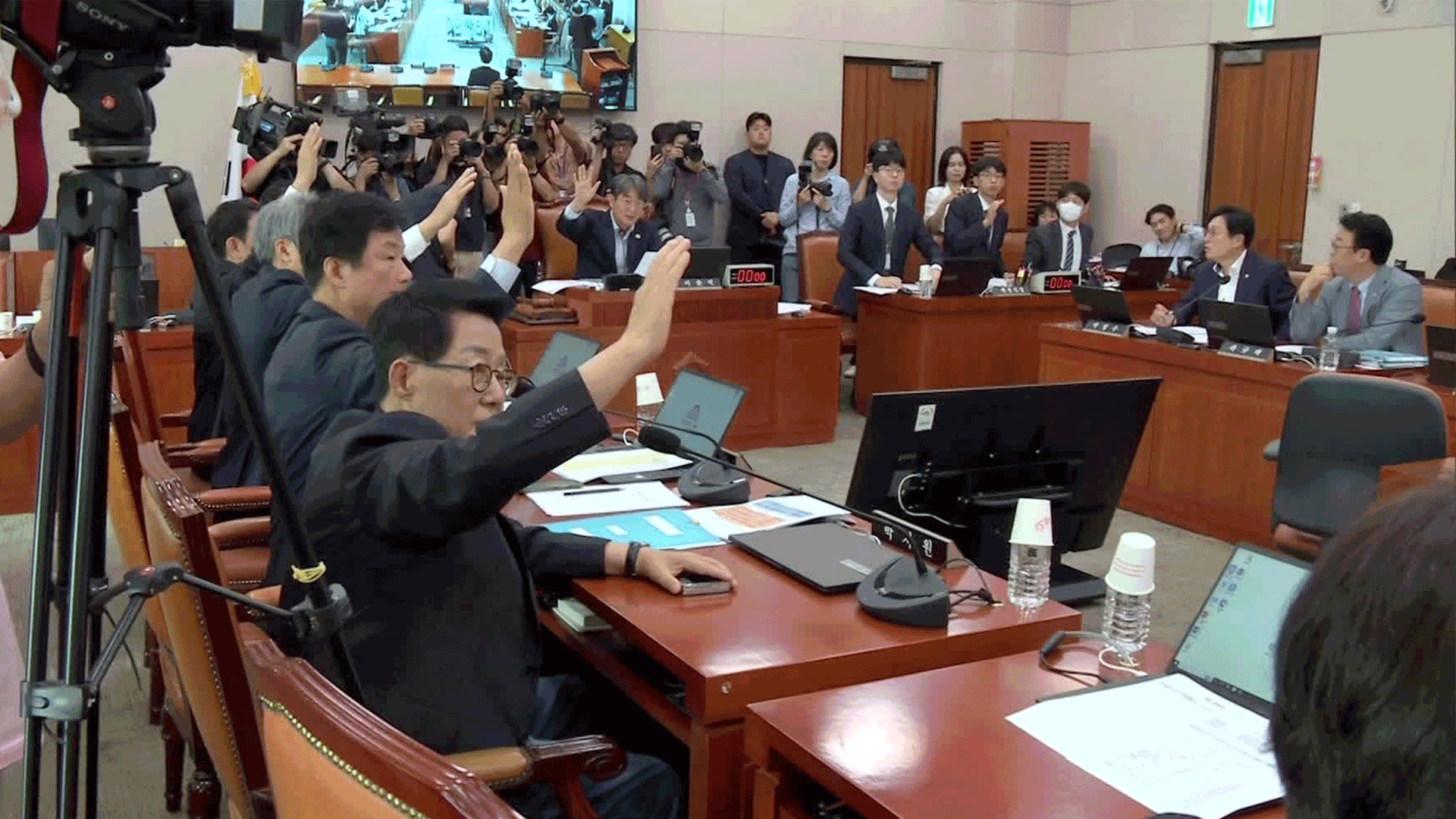[Anchor]
The heatwave continues to grip the country, and the nighttime heat has been just as intense.
Today (7.31), Seoul recorded its highest low temperature ever for July, along with the greatest number of tropical nights on record.
But forecasters say the unrelenting heat could ease slightly starting next week.
Here’s weather correspondent Kim Se-hyun.
[Report]
The sky over Seoul is filled with clouds.
As the sunlight is blocked, the temperature, which had been above 36 degrees for days, has dropped below 35 degrees for the first time in a week.
[Shim Song-hee/Namyangju, Gyeonggi Province: "It's been so hot lately that I couldn't go outside. The kids are on vacation, so I made a big effort to come out, but fortunately, it's a bit cloudy today, so it seems manageable."]
Today's highest temperature reached 34.6 degrees in Seoul, 37.7 degrees in Jeonju, North Jeolla Province, and 37.2 degrees in Andong, North Gyeongsang Province.
The heat will linger through Saturday, driven by the North Pacific high-pressure system hovering over the peninsula. But changes are on the way.
This is because the influence of the typhoons that prolonged this heat wave is diminishing.
Typhoon Co-may, which had strengthened the high pressure, was downgraded to a tropical depression today. And Typhoon Krosa, which kept the system stalled over Korea, is now moving off to the northeast.
As Krosa moves away, the high-pressure system is expected to weaken and shift northeastward.
Next Monday, the daytime temperature is expected to drop to 32 degrees in Seoul and 33 degrees in Daegu.
However, with the humid south wind blowing, the perceived temperature will be about 1 to 2 degrees higher.
And with high humidity continuing, tropical nights are expected to persist.
Today, Seoul recorded a low of 29.3 degrees—its highest ever for July in 117 years of observation. The number of tropical nights this month has also reached 22, surpassing the previous record set in 1994.
The Korea Meteorological Administration says showers are likely in central regions around next midweek, as drier northern air pushes down across the peninsula.
This is Kim Se-hyun, KBS News.
The heatwave continues to grip the country, and the nighttime heat has been just as intense.
Today (7.31), Seoul recorded its highest low temperature ever for July, along with the greatest number of tropical nights on record.
But forecasters say the unrelenting heat could ease slightly starting next week.
Here’s weather correspondent Kim Se-hyun.
[Report]
The sky over Seoul is filled with clouds.
As the sunlight is blocked, the temperature, which had been above 36 degrees for days, has dropped below 35 degrees for the first time in a week.
[Shim Song-hee/Namyangju, Gyeonggi Province: "It's been so hot lately that I couldn't go outside. The kids are on vacation, so I made a big effort to come out, but fortunately, it's a bit cloudy today, so it seems manageable."]
Today's highest temperature reached 34.6 degrees in Seoul, 37.7 degrees in Jeonju, North Jeolla Province, and 37.2 degrees in Andong, North Gyeongsang Province.
The heat will linger through Saturday, driven by the North Pacific high-pressure system hovering over the peninsula. But changes are on the way.
This is because the influence of the typhoons that prolonged this heat wave is diminishing.
Typhoon Co-may, which had strengthened the high pressure, was downgraded to a tropical depression today. And Typhoon Krosa, which kept the system stalled over Korea, is now moving off to the northeast.
As Krosa moves away, the high-pressure system is expected to weaken and shift northeastward.
Next Monday, the daytime temperature is expected to drop to 32 degrees in Seoul and 33 degrees in Daegu.
However, with the humid south wind blowing, the perceived temperature will be about 1 to 2 degrees higher.
And with high humidity continuing, tropical nights are expected to persist.
Today, Seoul recorded a low of 29.3 degrees—its highest ever for July in 117 years of observation. The number of tropical nights this month has also reached 22, surpassing the previous record set in 1994.
The Korea Meteorological Administration says showers are likely in central regions around next midweek, as drier northern air pushes down across the peninsula.
This is Kim Se-hyun, KBS News.
■ 제보하기
▷ 카카오톡 : 'KBS제보' 검색, 채널 추가
▷ 전화 : 02-781-1234, 4444
▷ 이메일 : kbs1234@kbs.co.kr
▷ 유튜브, 네이버, 카카오에서도 KBS뉴스를 구독해주세요!
- Record-breaking heat
-
- 입력 2025-08-01 00:27:26

[Anchor]
The heatwave continues to grip the country, and the nighttime heat has been just as intense.
Today (7.31), Seoul recorded its highest low temperature ever for July, along with the greatest number of tropical nights on record.
But forecasters say the unrelenting heat could ease slightly starting next week.
Here’s weather correspondent Kim Se-hyun.
[Report]
The sky over Seoul is filled with clouds.
As the sunlight is blocked, the temperature, which had been above 36 degrees for days, has dropped below 35 degrees for the first time in a week.
[Shim Song-hee/Namyangju, Gyeonggi Province: "It's been so hot lately that I couldn't go outside. The kids are on vacation, so I made a big effort to come out, but fortunately, it's a bit cloudy today, so it seems manageable."]
Today's highest temperature reached 34.6 degrees in Seoul, 37.7 degrees in Jeonju, North Jeolla Province, and 37.2 degrees in Andong, North Gyeongsang Province.
The heat will linger through Saturday, driven by the North Pacific high-pressure system hovering over the peninsula. But changes are on the way.
This is because the influence of the typhoons that prolonged this heat wave is diminishing.
Typhoon Co-may, which had strengthened the high pressure, was downgraded to a tropical depression today. And Typhoon Krosa, which kept the system stalled over Korea, is now moving off to the northeast.
As Krosa moves away, the high-pressure system is expected to weaken and shift northeastward.
Next Monday, the daytime temperature is expected to drop to 32 degrees in Seoul and 33 degrees in Daegu.
However, with the humid south wind blowing, the perceived temperature will be about 1 to 2 degrees higher.
And with high humidity continuing, tropical nights are expected to persist.
Today, Seoul recorded a low of 29.3 degrees—its highest ever for July in 117 years of observation. The number of tropical nights this month has also reached 22, surpassing the previous record set in 1994.
The Korea Meteorological Administration says showers are likely in central regions around next midweek, as drier northern air pushes down across the peninsula.
This is Kim Se-hyun, KBS News.
The heatwave continues to grip the country, and the nighttime heat has been just as intense.
Today (7.31), Seoul recorded its highest low temperature ever for July, along with the greatest number of tropical nights on record.
But forecasters say the unrelenting heat could ease slightly starting next week.
Here’s weather correspondent Kim Se-hyun.
[Report]
The sky over Seoul is filled with clouds.
As the sunlight is blocked, the temperature, which had been above 36 degrees for days, has dropped below 35 degrees for the first time in a week.
[Shim Song-hee/Namyangju, Gyeonggi Province: "It's been so hot lately that I couldn't go outside. The kids are on vacation, so I made a big effort to come out, but fortunately, it's a bit cloudy today, so it seems manageable."]
Today's highest temperature reached 34.6 degrees in Seoul, 37.7 degrees in Jeonju, North Jeolla Province, and 37.2 degrees in Andong, North Gyeongsang Province.
The heat will linger through Saturday, driven by the North Pacific high-pressure system hovering over the peninsula. But changes are on the way.
This is because the influence of the typhoons that prolonged this heat wave is diminishing.
Typhoon Co-may, which had strengthened the high pressure, was downgraded to a tropical depression today. And Typhoon Krosa, which kept the system stalled over Korea, is now moving off to the northeast.
As Krosa moves away, the high-pressure system is expected to weaken and shift northeastward.
Next Monday, the daytime temperature is expected to drop to 32 degrees in Seoul and 33 degrees in Daegu.
However, with the humid south wind blowing, the perceived temperature will be about 1 to 2 degrees higher.
And with high humidity continuing, tropical nights are expected to persist.
Today, Seoul recorded a low of 29.3 degrees—its highest ever for July in 117 years of observation. The number of tropical nights this month has also reached 22, surpassing the previous record set in 1994.
The Korea Meteorological Administration says showers are likely in central regions around next midweek, as drier northern air pushes down across the peninsula.
This is Kim Se-hyun, KBS News.
-
-

김세현 기자 weather@kbs.co.kr
김세현 기자의 기사 모음
-
이 기사가 좋으셨다면
-
좋아요
0
-
응원해요
0
-
후속 원해요
0















이 기사에 대한 의견을 남겨주세요.